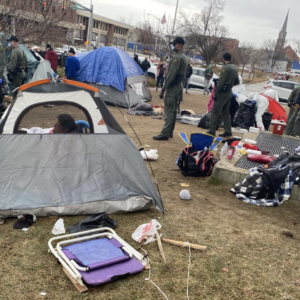Backed into a corner by a steady stream of negative press over the city’s homeless crisis, Manchester Mayor Joyce Craig got the legal go-ahead to clear a downtown homeless encampment.
Craig announced the evictions earlier this month in response to public outcry over the encampments downtown, with the original plan to clear the streets by Tuesday. However, the New Hampshire ACLU filed for a temporary restraining order to block the city from removing the homeless people, halting Craig’s plans.
On Tuesday, Superior Court Judge John Kissinger ruled the city can remove the approximately 50 homeless people from the sidewalk as the encampment represents a danger to the community at large.
Kissinger cited recent deaths, as well as close to 400 calls for police service at the camp, including assaults and drug overdoses.
“Considering the grave risks to public health and safety posed by the ongoing presence of the encampment on public sidewalks in downtown Manchester and the availability of safe alternatives for the people living in the encampment, a temporary restraining order is not justified,” Kissinger wrote.
Craig announced Tuesday the camps will be cleared Wednesday, with space being made available through a partnership with the YMCA to create a women’s shelter at the former Tirrell House. That space is the result of Gov. Chris Sununu’s intervention at the state level.
The city is also opening a temporary warming shelter with cots at the William B. Cashin Activity Center.
“City employees and non-profit partners have been working around the clock to ensure the health and safety of both the individuals experiencing homelessness in Manchester and the community at large,” Craig said in a statement released Tuesday afternoon.
Craig’s staff did not respond to NHJournal when asked if there would be enough space for all the homeless people being evicted.
Stephen Tower, a staff attorney with New Hampshire Legal Assistance, expressed disappointment in Kissinger’s ruling and cast doubt on Craig’s ability to adequately shelter the people she is evicting.
“Without a plan to immediately relocate and provide a higher level of shelter and services, this eviction will only perpetuate the cycle of chasing these houseless individuals from place to place, alienating and endangering them further,” Tower said.
Gillies Bissonnette, legal director with the New Hampshire ACLU, did not respond to a request for comment.
Also on Tuesday, Sununu sent a pointed response to a recent letter from Craig and seven other Democratic mayors attempting to shift the blame for their communities’ homeless problems onto the state. Craig, Nashua Mayor Jim Donchess, Berlin Mayor Paul Grenier, Franklin Mayor Jo Brown, Dover, Mayor Bob Carrier, Somersworth Mayor Dana Hilliard, Claremont Mayor Dale Girard, and Laconia Mayor Andrew Hosmer blamed Sununu in their Jan. 3 letter for not doing enough.
“The state has always and will continue to be open to meaningful collaboration on this issue with your cities and other municipalities across the state,” Sununu wrote. “However, politically motivated letters merely muddy the water and make that mutual goal of collaboration more difficult to achieve.”
Sununu’s letter recounted the millions of dollars the state has already put into dealing with homelessness and housing.
• $100 million for InvestNH to make rapid investments in more affordable housing
• $20 million for families in crisis through this winter
• $4 million to build statewide healthcare access for individuals experiencing homelessness
• $4 million for emergency shelter bed capacity and expansion in addition to our typical$2.9 million annual general fund appropriation
• $2.25 million for the landlord incentive program
• $1 million for winter warming shelters
Meanwhile, Sununu has repeatedly noted Craig and the other mayors are sitting on a combined $73 million in unspent federal funding that could be used on homeless shelters and services.
Alderman Joseph Kelly Levasseur said if Manchester residents want someone to blame, they should look to the other communities around the state, many with Democratic mayors, who have the resources to shelter some of the state’s homeless but are content to see them shunted off to the Queen City.
“Manchester is the dumping ground for the rest of the state,” Lavasseur told NHJournal. “If every community took just two or four people into their towns, the relief they could provide — not only to the city of Manchester but also these homeless persons — would be incredibly powerful. This has to be a state-wide issue dealt with by all towns, counties, and cities in New Hampshire.
“Manchester cannot continue to do this on its own; and provide our property owners and taxpayers the level of comfort, safety, and quality of life they deserve.”



